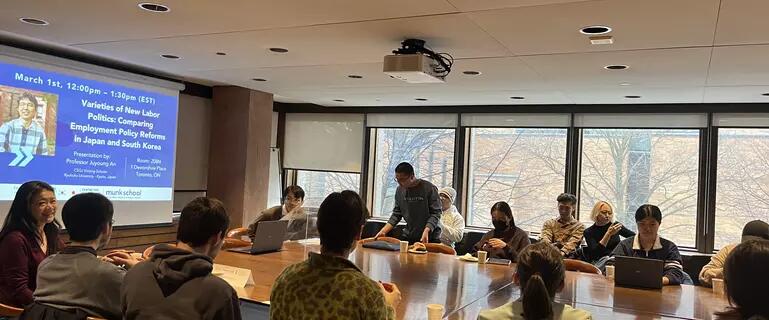
Event Report: Varieties of New Labor Politics: Comparing Employment Policy Reforms in Japan and South Korea
On March 1st at 12:00pm (EDT), Juyoung An, visiting Professor from Ryukoku University at the Centre for the Study of Global Japan, delivered a presentation comparing employment policy reforms in Japan and South Korea. This event was co-sponsored by the Centre for the Study of Korea.
Professor An started by discussing the main research question of his study: why did labor unions in Japan and South Korea respond differently to the expansion of platform labor? An noted that organizing platform workers is an increasingly contentious issue in labor politics, as current labor laws do not provide sufficient protections for workers who often find themselves as self-employed contractors for companies instead of formal employees (i.e., 'gig economy' workers). An centered the answer to his research question on two main themes: political influence and union membership.
South Korea and Japan historically share many similarities in employment practices and labor laws, with both governments introducing reform legislation after the Asian financial crisis of 1997. In South Korea, the Democratic Labor Federation and the Korean Labor Force are two bodies that promote the collective organization of platform workers on a national scale. Along with other trade micro-unions like Rider Union, national centers have different ways of approaching the challenge of how to incorporate gig economy workers into unions and how to extend employment protections to those under "special employment" circumstances. South Korea is moving away from the traditional union membership model, one that historically saw unions formed and directly connected to large companies. An noted that shifting away from the traditional union membership model is potentially why the nation has seen more successful employment reforms in this sector compared to Japan.
The Japanese gig economy exploded in 2016 when Uber entered the market. Despite low wages and health hazards experienced by workers, An noted that Japan is still in the early stages of responding as governments and unions alike are struggling to agree on a common solution. Japan's union membership model operates similarly to South Korea's, with unions being managed by their respective corporations. However, in Japan, traditional membership models are still entrenched, with the country experiencing less strike action and media coverage about gig economy workers compared to South Korea.
Following the presentation, a lively question and answer period ensued. An answered questions concerning the demographics of public opinion towards the gig economy, why labor strikes are more common in South Korea than in Japan, and how the notion of union membership will continue to shift in both countries. We would like to thank Professor Juyoung An for sharing his important research, as well as the large audience of students, staff, faculty and community members who were in attendance for this event.

